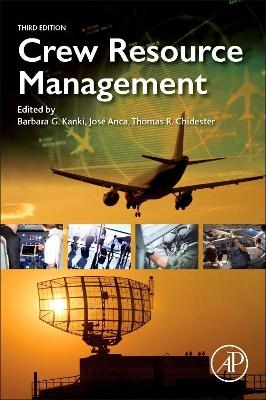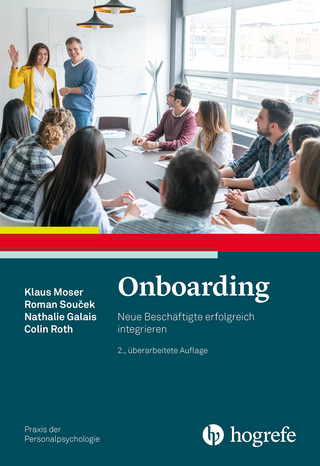
Crew Resource Management
Academic Press Inc (Verlag)
978-0-12-812995-1 (ISBN)
Dr. Barbara Kanki served as a Research Scientist at the National Aeronautics and Space Administration (NASA), Ames Research Center (Moffett Field, California) in the Human Systems Integration Division. Over her tenure of more than 25 years, she conducted human performance research in support of NASA Aviation Safety Programs, Human Factors and Performance for Space Safety, and a variety of Human Factors programs for the Federal Aviation Administration (FAA). In a consulting role she worked with other high risk industries such as the medical and nuclear power fields. Dr. Kanki’s research activities have ranged across human factors topics such as crew communication and coordination, organizational factors, information and workload management for aviation operations including flight crews, ground control, and technical operations. Her research interests include human-centered procedure and document design, integration and training for new technologies as well as safety topics such as voluntary reporting and event investigation. She has supported the space side of NASA in human and socio-technical risk factors, team training, and procedure design primarily for the space shuttle program at Kennedy Space Center and has participated on NASA mishap boards, safety assessments and National Transportation Safety Board human performance investigations. After retiring from NASA in 2014, Dr. Kanki continues to contribute to NASA projects and FAA/industry groups, and is the current chair of the Human Performance working group of the International Association for the Advancement of Space Safety. Dr. Kanki received her doctorate in Behavioral Sciences from the University of Chicago, where she specialized in the areas of communication and group dynamics. She continues to author, edit, and review books, journals, and papers on human factors topics. Joey Anca is the Human Risk Manager for Metro Trains Melbourne in Australia. Joey has a long career in aviation, having pioneered with Bob Helmreich the Cockpit Management Attitudes Questionnaire (CMAQ), when the known universe was grappling with the new-found pill of Crew Resource Management (CRM). Bob (the NASA/UT team, Joey and other aviation earthlings) took off into other safety-critical domains. Joey is a proud Filipino who has worked in a number of airlines and railways in Australasia. He lives in Melbourne, Australia and teaches Threat and Error Management (TEM) at Swinburne University of Technology. His day-job is keeping the railways in Melbourne safe. Tom Chidester joined the Federal Aviation Administration’s Civil Aerospace Medical Institute (CAMI) in December of 2005 to serve as Manager of the Human Factors Research Branch, and was promoted to Aerospace Human Factors Division Manager in August 2008. In 2013, he began acting as the Deputy Director of CAMI, and was selected for this position in 2014. He previously conducted research at NASA Ames Research Center and managed Human Factors and Safety Training for American Airlines. His experience includes developing classroom and simulator training programs, and analysis, publication, and reporting for FOQA and ASAP programs. Tom holds Masters and Doctoral degrees in Psychology from the University of Texas at Austin.
Part I: The Nature of CRM 1
1. Why CRM? Empirical and Theoretical Bases of Human Factors Training
2. Teamwork and Organizational Factors
3. Crews as Groups: Their Formation and Their Leadership
4. Communication and Crew Resource Management
5. Flight Crew Decision-Making
6. CRM (Nontechnical) Skills: A European Perspective
7. Crew Resource Management and Individual Resilience
8. Crew Resource Management, Risk, and Safety Management Systems
Part II: CRM Training Applications
9. The Design, Delivery, and Evaluation of Crew Resource Management Training
10. Line Oriented Flight Training: A Practical Guide for Developers
11. Line Operations Simulation Development Tools
12. Crew Resource Management and Line Operations Safety Audit
13. Maintenance Resource Management for Technical Operations
14. Flight and Cabin Crew Teamwork: Improving Safety in Aviation
15. The Migration of Crew Resource Management Training
Part III: CRM Perspectives
16. A Regulatory Perspective
17. A Regulatory Perspective II
18. The Accident Investigator’s Perspective
19. The Military Perspective
20. Cultural Issues and Crew Resource Management Training
21. Airline Pilots, Training, and CRM in Today’s Environment
22. The Future of CRM
| Erscheinungsdatum | 08.02.2019 |
|---|---|
| Verlagsort | San Diego |
| Sprache | englisch |
| Maße | 152 x 229 mm |
| Gewicht | 1000 g |
| Themenwelt | Geisteswissenschaften ► Psychologie ► Arbeits- und Organisationspsychologie |
| Sozialwissenschaften ► Politik / Verwaltung ► Europäische / Internationale Politik | |
| Technik ► Fahrzeugbau / Schiffbau | |
| Technik ► Luft- / Raumfahrttechnik | |
| Wirtschaft ► Betriebswirtschaft / Management ► Personalwesen | |
| ISBN-10 | 0-12-812995-6 / 0128129956 |
| ISBN-13 | 978-0-12-812995-1 / 9780128129951 |
| Zustand | Neuware |
| Haben Sie eine Frage zum Produkt? |
aus dem Bereich


